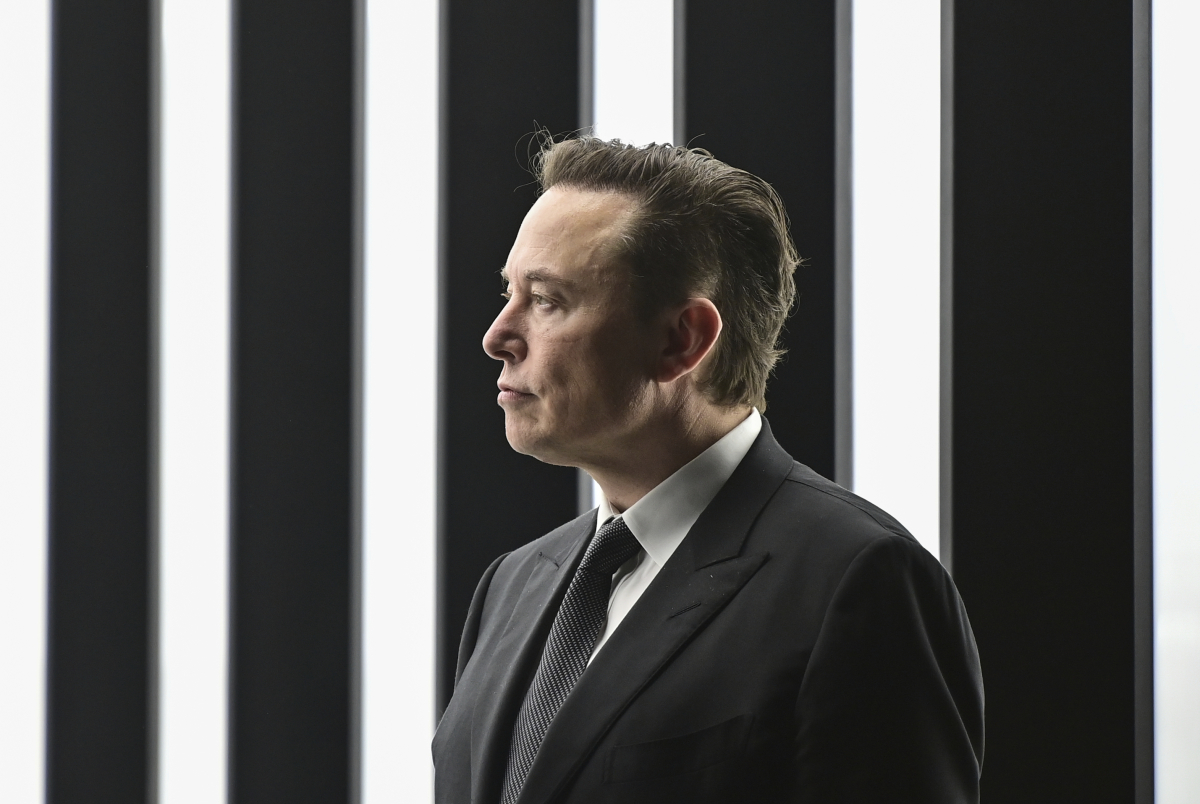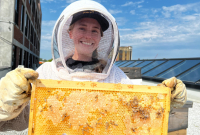Support strong Canadian climate journalism for 2025
This is not a column I wanted to write. As someone who uses Twitter to a degree that might be described as “unhealthy”, I took a particular interest in the long-running saga of Elon Musk’s attempt to buy (and then get out of buying) the company. My hope was that his interest would pass, he’d find a way to wriggle out of the deal, and we could all get on with our lives. But with Twitter now worth only a fraction of the $54.20 per share he offered, the company’s board of directors had no choice but to call him on his bluff — and hand him control over the closest thing we have to a digital town square.
It hasn’t exactly been an auspicious start for Mayor Musk. By firing CEO Parag Agrawal and two other top Twitter executives, Musk had to pay out nearly $200 million in bonuses and stock options. That hit pales in comparison to the one he took on the deal, given that the entire tech market has crashed in the months after he made his offer to buy the company. As Pivot co-host Scott Galloway tweeted on Thursday, “Today Parag gained $42m, and Elon lost $33b. Let that sink in.”
That financial pain could pale in comparison to what’s still to come for Musk, given his own behaviour as Twitter’s new owner. In a letter to advertisers he promised that the site “obviously cannot become a free-for-all hellscape, where anything can be said with no consequences….our platform must be warm and welcoming to all.” But those consequences almost certainly won’t apply to him, and his recent comments should give those advertisers plenty of pause.
On Saturday, Hillary Clinton tweeted a story from the LA Times about the violent attack on Nancy Pelosi’s husband, perpetrated by a Canadian expat in thrall to Qanon conspiracy theories and other far-right bile. “In the months before police accused him of attacking House Speaker Nancy Pelosi’s husband Friday morning,” the piece begins, “David DePape had been drifting further into the world of far-right conspiracies, antisemitism and hate, according to a Times review of his online accounts.”
But Musk wasn’t buying it. “There is a tiny possibility there might be more to this story than meets the eye,” he tweeted at Clinton. To back up this claim he linked to a story from the Santa Monica Observer, a well-documented purveyor of misinformation that once reported Hillary Clinton had died and was replaced with a body double for a 2016 debate with Donald Trump. Its other greatest hits include false stories about Kanye West being appointed to Trump’s government, sunlight being an effective treatment for COVID-19 and Bill Gates being responsible for a polio epidemic.
Not exactly the New York Times, in other words. But it was good enough for Elon Musk, apparently, and that should raise serious doubts about both his ability to spot disinformation and his platform’s willingness to snuff it out. As American writer Molly Jong-Fast tweeted, “this exchange between @HillaryClinton and @elonmusk should kill any remaining confidence advertisers had in the platform.” In the ensuing backlash, Musk later deleted the tweet.
It should also attract the attention of government officials in countries where Twitter operates — including Canada. It’s time — long past time, actually — for them to regulate these social media platforms more aggressively and stop them from serving as amplifiers of misinformation, fear, and loathing. The spread of conspiracy theories around COVID-19 on these platforms, and the damage that’s done to public health and safety, should be all the evidence these governments need to act.
But if they need more, apparently Musk is determined to give it to them. It’s abundantly clear, given both his statements about being a “free speech absolutist” and his own interventions on Twitter, that Musk isn’t going to crack down on the spread of misinformation or conspiracy theories. That those are poisoning the public square he now owns and contributed directly to the violence he says he abhors, whether it’s the January 6th coup attempt or any number of lesser incidents, doesn’t seem to register with him.
He may yet rein himself in, if only because his behaviour on Twitter now affects the bankers and financiers who backstopped his purchase of the company. If things get really ugly, it could damage the value of Tesla’s brand, sink its stock even further, and even threaten his ownership of the company. But government regulators can’t depend on Musk’s financial imperatives to save him from himself. They may need to do it for him.
The rest of us, including those who are unapologetically addicted to his platform, need to keep our eyes peeled for new alternatives. Like most journalists, politicians, and other public affairs junkies, I’ll stay on Twitter because I have to — and because, even for all of its multiplying warts, I still enjoy it. But if another credible alternative arises, one that can actually create the sort of “warm and welcoming” environment Musk talked about, he could be left holding a $44 billion bag filled with little more than a bunch of Russian bots and MAGA trolls. Free speech, after all, doesn’t mean freedom from the consequences that flow from it — even for the richest man in the world.






Comments
A broken telephone line
Normally people that write about Elon Musk the way you do are people that did not even listen to him directly to understand what this genius of the century is trying to achieve.
His mission to ‘accelerate the transition to a sustainable future for the humanity’ has obviously escaped you. A sustainable future would be good for you and your children too.
Your article looks like a reckless repeat of paraphrases heard from the cousin of an uncle or are you just peddling clickbait big titles from all the haters that accomplish nothing good for humanity.
You don’t become the richest man in the world because of all his success with goofy ideas that you think he is capable of.
Your article tells more about you than the person you are trying to insult.
It's possible you're right, I wouldn't rule it out. But you haven't actually presented any arguments at all. "He's very smart, so he must be right" is not an argument, it's a fallacy.
I myself have recently started to wonder if Musk hasn't been acting like a weird anti-vaxxer right wingnut just as a cunning ploy to get right wing good ol' boys to buy the Cybertruck. Consider: Tesla doesn't do advertising; Elon Musk being controversial basically is Tesla's advertising. Progressives and nerds are already on board with electric vehicles in general and Tesla in particular. But who isn't buying electric? Right wingnuts. If Musk positions as a right wingnut, Tesla will be a brand right wingnuts can buy even though it's electric. And let's face it, the basic design and name of the Cybertruck positions it to look cool to nerds who are into cyberpunk--but not a lot of us buy pickup trucks. Right wingnuts buy pickup trucks.
I'm not married to this thesis, mind you--it's just an interesting speculation. Musk might be pretty much what he appears--he's certainly anti-union and pro-third-world-coup.
You just proved my point.
You would not ask what arguments I have, if only you listened to Elon Musk himself, instead of peddling what the haters are saying about him and all the noise.
What is disturbing for some people is that he became a billionaire by doing good for humanity as an engineer and not for profit as an investor like Warren Buffet or Bill Gate who will invest in anything as long as it makes money. At this rate Elon Musk will most likely become the first trillionaire by providing a sustainable future for humanity by engineering and intelligent algorithms.
It is abundantly clear to any intelligent person that takes the trouble to listen to Elon Musk and learn what he has achieved that he is not only smart but right too and he surrounds himself with bright people.
Sometimes I wish Tesla would buy publicity in the media to correct all this noise around him and Tesla, but he prefers to spend the profits in R&D. That is why Tesla is so far in advance with superior products. It is an easy target and good clickbait for the media.
How fallacious can the media be when they have no publicity revenues to lose from Tesla?
Do yourself a favour and listen to Elon Musk himself and learn in what context he responds to attacks or leading questions like the one about tRump by Peter Cambell on CNet. Uninformed people are making a lot of mileage with this one.
This is a fact: Musk has already used Twitter to promote a cockamamie theory about the attempted murder of Nancy Pelosi's husband. He deleted it a few hours after it was posted. Here's the story: https://www.theguardian.com/commentisfree/2022/oct/31/elon-musk-paul-pe…
The first question that everyone should ask about this deal is, Musk has invested $44 BILLION into Twitter. What does he expect to get in return for all this money?
I also want to point out that, like a lot of engineers, Musk doesn't understand that just because something is technologically possible, doesn't necessarily mean that it's a good idea. The most blatant example of this is driverless tractor/trailers. Hopefully, this idea will go away the first time one of these hits a pedestrian, and the victim or his family sues the living daylights out of the owner of the vehicle.
Some serious hero-worship there, to the point of god-like omniscience don't you think? Brilliance is indeed magical and inspiring but read the Guardian article linked on this page by Robert Reich; it's straight up right-wing nutbar.
And he's obviously a raging narcissist who takes pride in throwing serial and substantial spanners into the works; his face is the picture of boyish delight as he cavorts for the camera but he's also geekish and awkward with it, so is it also the ultimate revenge of the nerds?
Was the latest stunt of buying Twitter just dramatically crashing the party of what is perceived to be the cool people of the type he is not?
Whatever his motivations, he's become increasingly alarming to watch, like someone melting down at some level because there's a kamikaze style to his actions.
If he's making some sort of a bid for political power we should all be worried. Personally I hope he shuts down Twitter and everyone gives their head a shake.
Robert Turd Reich speciality is to build a wall of hate around Elon Musk. The Gardian has no money to lose, because Tesla wastes no money on publicity to lie to the public.
Comme on dit ici, The Gardian est une Putte à clics.
I'm still surprised that any thinking person spends time on that site. The few times I've followed a thread....or made a comment, it all seemed pretty much like bits of straw disappearing in a high wind. The comment limit is so small, you have to start with your conclusions....developing an argument is difficult to impossible...and unless you're on so often that you develop 'followers' the chances of engaging in anything resembling dialogue are small to non existent.
A bit like comments on National Observer...there really isn't much in the way of interesting exchanges...but at least here, one gets to write in complex sentences. On twitter it seems, the fragment rules.
The polite political thing to do would be to boycott the site. Leave it to the bots...and contemplate a sc fi movie: THE WAR OF THE BOTS....set it on Mars and Elon's fragment of ultra omnipotence will be history.
In terms of Twitter alternatives, I've heard good things about Mastodon. I can't say for sure, since I use neither Twitter nor Mastodon (nor Facebook, etc etc etc).
More broadly . . . the main problem with Twitter, Facebook and some of the others is an odd combination of the profit motive and certain aspects of human psychology. Similar to "if it bleeds, it leads" in normal media, it turns out that "engagement" can be driven effectively by highly emotive content that arouses anger and fear. Highly emotive content that arouses anger and fear almost inevitably has political implications. And in social media, "engagement" drives profits.
So even if the ownership is politically completely neutral, they have an interest in having their platform push politically extreme content. In theory, that could be either the extreme right, more or less fascist, or the extreme left--militant socialists calling for the defenestration of plutocrats. But the ownership never is politically completely neutral; if nothing else, by definition they're going to be in favour of wealthy corporate ownership. So the politically extreme content they will not mind driving their profits will inevitably be the fascist kind.
So. For-profit social media platforms have an inherent tendency to promote fascism, whether somebody a bit nutty is in charge or not. Arguably, to avoid this and a number of other problems, social media should be a public service or some kind of decentralized open source endeavour (I believe Mastodon is like that). I think there's room for both of those options, but for-profit social media is bad for society.
I've been a big Twitter user (@GuanajuatoBob) for three years, but plan to quit it after the US election next week. I'll switch to whatever is the best alternative available.
I've already found myself using Reddit a lot more.
I'm kicking the tires on CounterSocial. My handle there is @[email protected]